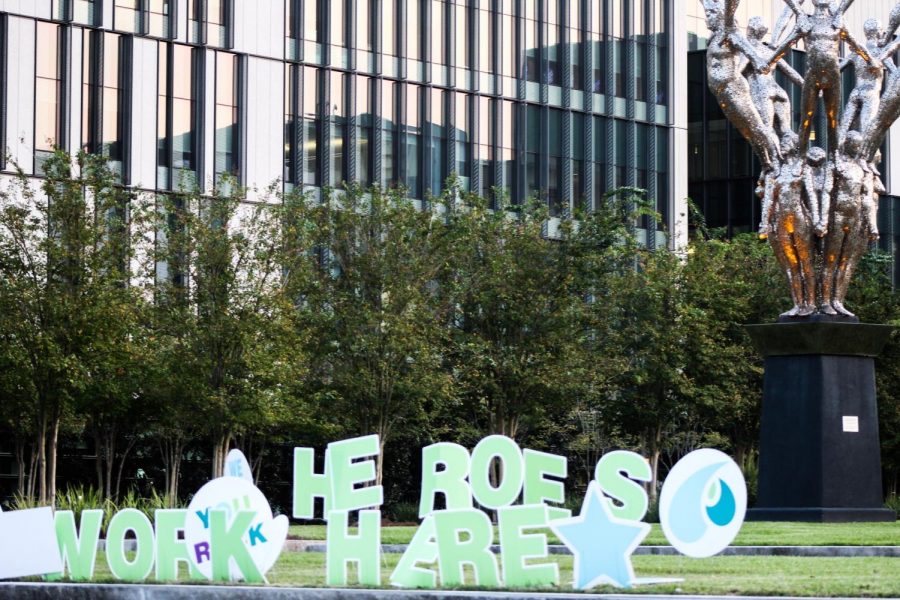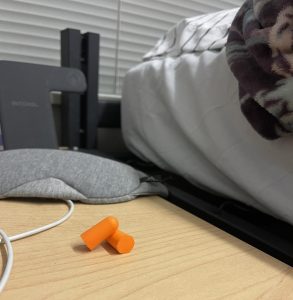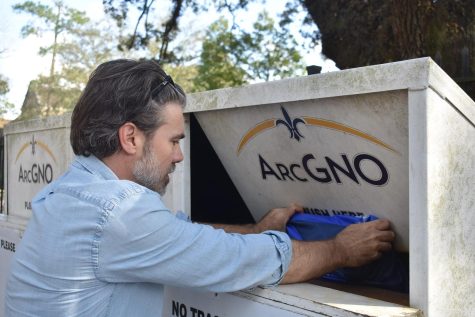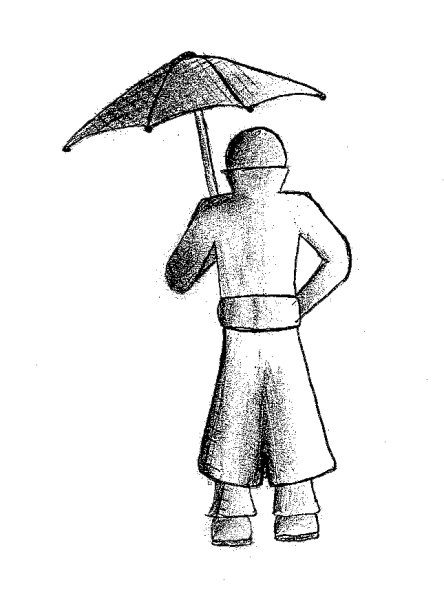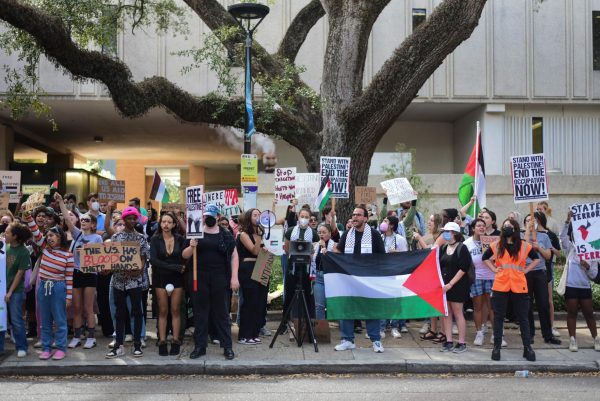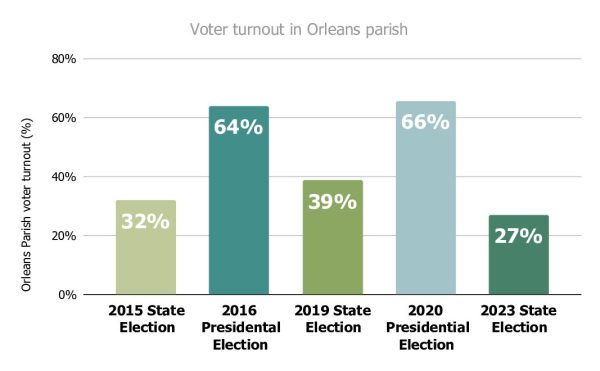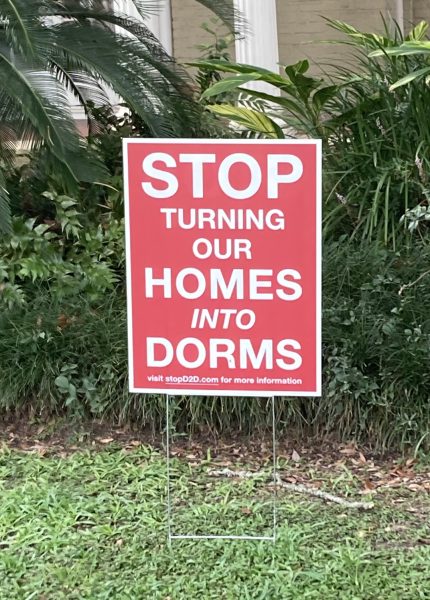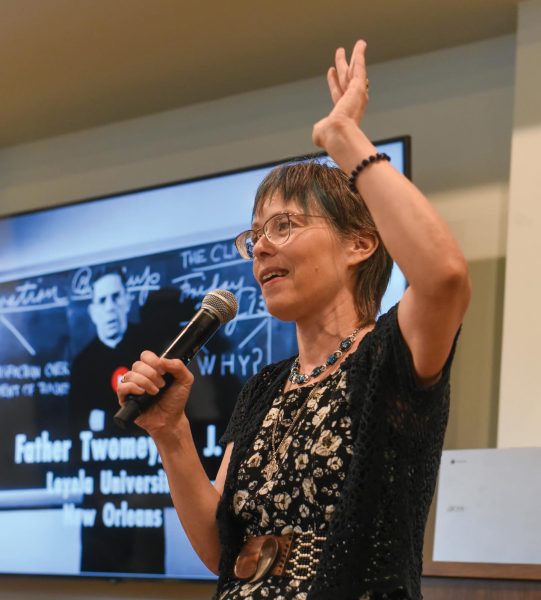Healthcare workers experience psychological distress amid COVID-19
A “Heroes Work Here” sign sits in the front lawn of University Medical Center in New Orleans Oct. 4, 2020. During the COVID-19 pandemic, some healthcare industry workers have said that they’ve experienced stress and exhaustion due to long hours. Photo credit: Erin Haynes
October 29, 2020
As COVID-19 victims continue to overwhelm healthcare facilities, workers are experiencing psychological distress from limited self-care, short staffing, lack of equipment and overwhelming work shifts.
For healthcare facilities that have not run out of equipment or safety gear, workers wear protective garments from head to toe to prevent infection.
Nurse Cindy Andrews, a licensed practical nurse at University of Tennessee Methodist Physicians, is an officer for cardiologists. Andrews said she meets with 10 to 30 patients daily, while wearing a mask, gloves, safety goggles, face shield and a gown.
“It puts more strain on you because you’re dying underneath all of this, and you’re just sweating to death,” Andrews said.
Andrews said she feels her mental health is affected because she’s afraid to catch the virus from patients who test COVID-19 positive, and the long work hours from short staff has led to difficulties with decision making.
“There’s so many things to take into account now. I don’t think people understand that. They think you’re made of armor and nothing really affects you,” Andrews said.
“The conditions of other healthcare workers is keeping me up at night with everything I see on television,” said Kim Ernst, who is an inactive registered nurse and a psychology professor at Loyola University New Orleans.
Ernst hasn’t been employed in a hospital for years because she said she felt overwhelmed from short staffing and mistreatment from the healthcare system.
“I had nights where I worked in the ER of Charity Hospital many years ago, and you got a massive number of gunshot victims in one night. Everybody scrambled and did their best. But, at some point, it’ll pass until the next occasion. Not this ongoing one after another. I remember telling (the])anesthesia (department,) ‘I cannot take any more patients,’” Ernst said.
Ernst worries that the lack of safety equipment and ventilators within hospitals adds more stress to healthcare workers and she feels the United States needs to re-examine its healthcare system.
“The idea of PPE telling nurses and physicians to reuse gloves and masks is just unimaginable. That’s not what the United States of America represents, right? It’s nice to know that we usually take care of our own and we have a better handle. And to think we’re one country with one of the highest rates of transmission. The healthcare is scary. It just simply is,” Ernst said.
Healthcare workers feel pressured to remain stoic in front of patients because it is frowned upon to request a break or express mental health concerns, according to Andrews.
Robert John Sawyer, who is a neuropsychologist at Ochsner Health and the medical director for professional staff experience within the Office of Professional Well-Being in New Orleans, said staff needed to feel “authentically supported” by those within their organization.
“Ochsner was well equipped to do this quickly because it had spent the past two to three years standing up an Office of Professional Wellbeing to specifically address stress and burnout among its workforce,” Sawyer said.
Sawyer said Ochsner worked hard to ensure stable jobs/payments and free child care, created a 24/7 crisis line staffed by behavioral health technicians, and established decompression rooms for yoga, mindfulness and massages.
While Ochsner focused on healthcare workers’ well-being, Ernst believes other healthcare facilities are secretive about staff cuts and long shifts.
“My knee jerk reaction was the exposure that it will provide. I suspect hospitals don’t want to go on record saying, ‘Yep, we told nurses to quit,’ if they weren’t going to stay on,” Ernst said.
Despite the stress and exhaustion from working, healthcare workers are striving to put their patients’ needs before their own to ensure they feel cared for, Andrews said.
“What about the family members who’ve dealt with losing a loved one? Children of two and three years old and lost both parents? It brings you down,” said Ernst.
On May 7, 2020, Pew Research Center found that one-third of Americans have experienced high rates of psychological distress, such as anxiety, sleeplessness or depression.
Ernst said that many healthcare workers were battling mental disorders before COVID-19 and the pandemic likely accelerated the decline in mental health.
Dr. Jessica Gold, a Washington University assistant psychiatry professor and member of the American Psychiatric Association’s Council on Communications, said that the healthcare industry has the highest rates of suicide and depression of any other profession.
“If we aren’t talking about it, and ‘appear’ able to do our jobs without any challenges, it would be surprising for other people to notice it was an issue and start talking about it on their own,” Gold said.
Gold said that it is essential that healthcare workers take care of themselves first, in order to have a sustainable workforce during the pandemic and so they do not have long term mental health effects.
“We know that stressful experiences can cause later symptoms of anxiety, sleep trouble, feelings of guilt/anger, and so forth. Having our staff take some time to talk about their experiences allows everyone to consciously process – together – what they went through,” Sawyer said.
Makala Ougel, a mental health technician at River Oaks Behavioral Center and a college student, said she prioritizes her self-care because she battles mental health issues.
“If I do a whole day of just work and school and I didn’t do anything, it’s really hard to go to work and take care of other people,” said Ougel.
Ougel and Andrews said most of their time is spent at home reading and doing household activities for relaxation and to avoid infecting their patients.
“It is critical to do this because we are human, and hiding our feelings and choking them down doesn’t mean we don’t have them,” Gold said.
With the change in season and the expected surge in coronavirus cases this fall and winter, Ernst hopes healthcare workers find a balance between caring for their patients and themselves for the sake of the community as a whole.
“Rosie the Riveter would say that those who are stronger need to support those who need it, no matter what profession you’re in. Lend a helping hand. Do what you can,” Ernst said.
This story has been updated as of 4:18 p.m. Nov. 6 to more accurately reflect Jessica Gold’s employment titles.


